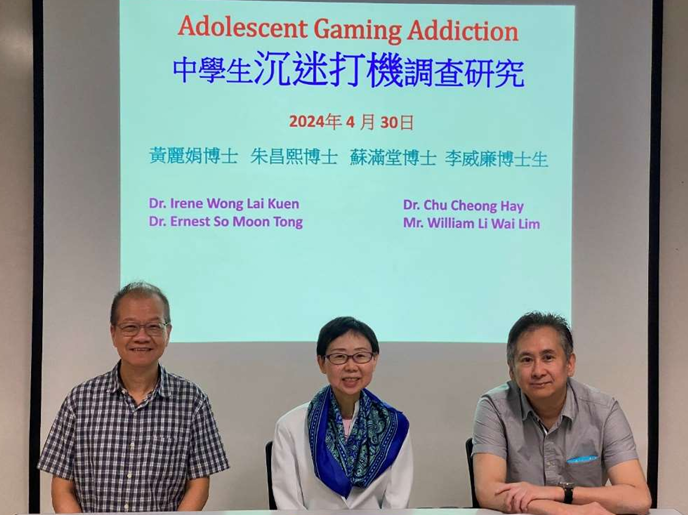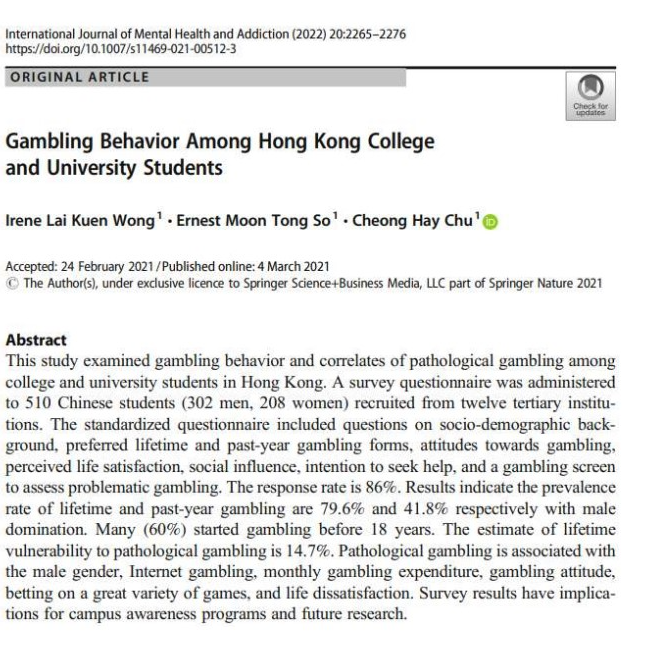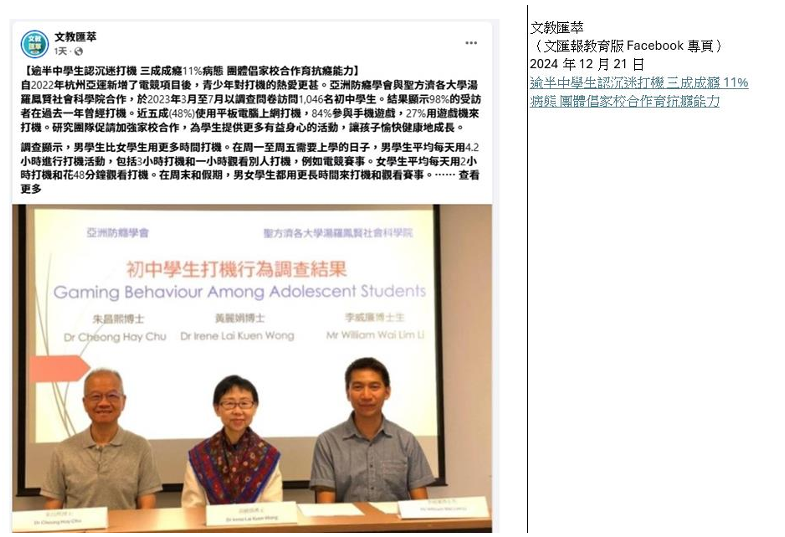 載入中...請稍候...
載入中...請稍候...訂閱電子報
Prevention Is Better Than Cure
Enquiry: 852 9494 3770; 852 3702 4502; 852 9677 3208
Email: aaap.asian@gmail.com
Website: http//www.aaapasian.com
You are welcome to join as a member and support us with a donation
Donation: Bank of East Asia Limited (account number: 015 255 6800 8223)
Mission
The Asian Association of Addiction Prevention (AAAP) was established in 2018 with the mission to promote addiction prevention among the Asian communities around the globe.
Purposes
. To promote skills and scientific knowledge of addiction prevention
. To exchange wisdom on addiction prevention and research
. To identify vulnerable groups for resiliency education
. To explore culturally appropriate strategies to address addiction problems
. To share information on addiction prevention with local, Asian and international interested organizations
Professional Service
With local and international experts’ support, the Association provides the following services:
. Addiction research
. Assessment of addictive behavior and comorbid disorders or health problems
. Professional consultation and supervision
. Prevention and educational seminars, workshops, training and talks
We welcome collaboration with private, government and non-governmental organizations.
We provide intensive awareness training, workshops, seminars and talks which cover the following topics:
Addictive behaviors (e.g. addiction to gaming, gambling, drugs, tobacco, alcohol, Internet and sex)
. classification, diagnosis and assessment of addictive behaviors
. development, etiological factors, consequences and impact of addictions
Addictive behaviors and co-occurring health problems
Identification of vulnerable or high-risk groups
Preventive strategies, treatment approaches and intervention models
 |
President Dr. Irene Lai Kuen WONG 黃麗娟博士 (會長)PhD (UNSW, AU), MSocSc (HKU), CT (CCPC, CA), RSW (HK), ITTGRPP (NZ) (aaapirene7@gmail.com) |
 |
Vice President Dr. Ernest Moon Tong SO 蘇滿堂博士 (副會長)PhD, MPhil, MSocSc, LLM (HKU), PgD (UK), CStat (RSS, UK), Dip (HKSYC) (aaapernest@gmail.com) |
 |
Treasurer Dr. Cheong Hay CHU 朱昌熙博士 (司庫)EdD (OUHK), MSoSc (HKU), GDBA (MU, AU), RSW (HK) (aaaphay@gmail.com) |
International AdvisorsProfessor Robert Ladouceur, Laval University, Canada |

亞洲防癮學會(Asian Association of Addiction Prevention)於二零一八年成立,致力於為亞洲社群推廣預防成癮問題的事工 宗旨1. 推廣預防成癮行爲的知識與技巧 2. 促進交流和研究 3. 辨識脆弱組群,提升抗逆力 4. 探討及設計預防成癮問題的策略 5. 為本港、亞洲及國際組織和不同持份者提供預防成癮問題的資料 |
專家團隊承蒙本地及國際專家的支持,本會提供以下的專業服務:
我們歡迎與機構合辦活動、研究和訓練。 852 9494 3770; 852 3702 4502 aaap.asian@gmail.com http//www.aaapasian.com |
培訓和預防教育課程内容專業訓練課程、工作坊及講座由專家團隊提供,内容包括:
|
Themes of the Year
2018 - 2022: FIFA World Cup and Problem Gambling
2023 - 2025: Gaming Disorder, Esports Betting and Health Issues
Events and Activities
2024 Video Gaming Research Press Release (12/2024)
初中學生打機行爲調查研究新聞發佈(2024年12月)

Adolescent Gaming Study 1
The study was jointly conducted by the Asian Association of Addiction Prevention (AAAP) and Felizberta Lo Padilla Tong School of Social Sciences, St. Francis University. In 2023, a gaming survey questionnaire was filled by 1046 adolescents aged 12-15 years. Survey measures focused on game playing habits, perceived self-control, self-esteem and generalized anxiety. Results indicate that 97% of the survey participants played video games. One-third were probable excessive problem gamers, and one-tenth could be classified as pathological gamers with symptoms of addiction. Pathological gaming is associated with low self-esteem, lack of self-control and anxiety. Findings have implications for preventive strategies.
Study 2: Sex Differences in Video Game Playing
The study was jointly conducted by the Asian Association of Addiction Prevention (AAAP) and Felizberta Lo Padilla Tong School of Social Sciences, St. Francis University. 1051 survey questionnaires were filled by secondary school students. Males dominated in video game playing, online game viewing, and disordered gaming. Boys played games mainly for fun (53.6%) and relieving boredom (52.7%). Girls also sought entertainment (46.4%) and boredom reduction (47.3%). The major negative impact of game playing reported by boys was poor academic results (52%), whereas girls experienced fatigue (56%). Gender-specific intervention was proposed to address adolescent gaming problems.
家長篇: 預防子女沉迷打機的策略
- 與子女㇐起訂立打機協議 (包括打機時間表)
To create agreements on playing video games with your children (e.g. work out a gaming timetable) - 設立賞罰規則,以培養子女的自律性
To foster children’s self-discipline by enforcing rules of rewards and punishments - 鼓勵參與有利身心理健康的活動和培養不同興趣
To encourage children to enjoy different health-enhancing activities and hobbies - 要以身作則,並宜對電玩有了解,以助親子溝通
To be a role model with knowledge of gaming may improve parent-child communication - 如發現子女沉迷打機, 宜尋求專業協助
To seek professional help to cope with children’s excessive gaming problems
Prepared by Mr. William Li and Dr. Irene Wong
Recent Activities
Dr. Irene Wong attended the 2021 Best Practice Awards presentation ceremony organized by the Hong Kong Council of Social Services in December 2022.
Dr. Cheong Hay Chu reported the major findings of a study on mental health issues at the press conference held jointly with Caritas Family Services in December 2022.


Research and Press Conferences (2018-2020)
 |
Study 1 2018 FIFA World Cup: Gambling Problems among Hong Kong College and University Students The study was jointly conducted by the Asian Association of Addiction Prevention (AAAP) and Felizberta Lo Padilla Tong School of Social Sciences, Caritas Institute of Higher Education (CIHE). |
 |
Study 2 2018 FIFA World Cup: Problem Gambling among Hong Kong Secondary School Students The study was conducted by the Asian Association of Addiction Prevention (AAAP) and Felizberta Lo Padilla Tong School of Social Sciences, Caritas Institute of Higher Education (CIHE). A total of 610 secondary school students were distributed a survey questionnaire (response rate: 85%). The rates of lifetime and past-year gambling are 63% and 39% respectively. The lifetime gamblers placed their first bet at 10.1 years, while 9.7% could be classified as pathological gamblers. More than a third reported problem gambling among their family members. Correlates of pathological gambling were identified. The survey results have implication on preventive and awareness programs. |
Study 3 2018 FIFA World Cup: Gender Differences in Soccer Betting
The study was conducted by the AAAP and the CIHE. Altogether 1,028 students filled a survey questionnaire. Eight percent of 518 high school students and 20% of 510 tertiary students were attracted to bet on the 2018 FIFA World Cup soccer games. Females were encouraged to play by gambling peers and family members, while males wanted to win money. High school and tertiary students began gambling at 9 and 10 years (mean age) respectively. Many reported problem gambling among their peers and family members.
Study 4 Youth Illegal Gambling in Hong Kong
During 2018-2019, a youth survey and in-depth interviews were conducted by the Asian Association of Addiction Prevention (AAAP) and Felizberta Lo Padilla Tong School of Social Sciences, Caritas Institute of Higher Education (CIHE). A standardized questionnaire was distributed to 1203 students recruited from secondary schools and tertiary institutions. The response rate was 85.5% (581 men and 447 women). One-tenth of the survey participants (10.2%) wagered online at offshore gambling sites in the previous year.
They were involved in illegal gambling as engagement in any gambling activities not authorized by the Hong Kong government is a criminal offence. Hence, gambling at offshore gambling sites was unlawful. Men dominated in illegal gambling (tertiary students: 75%; high school students: 49%). Illegal football betting was the most favorite game (77.5%). Compared with the student gamblers who staked at legal gambling providers, the illegal gamblers were more vulnerable to problem gambling. They also reported higher life dissatisfaction and perceived stress.

https://hk.on.cc/hk/bkn/cnt/news/20201212/bkn-20201212173014159-1212_00822_001.html
Opening Event (2018)

Opening Ceremony of 2018-2019 Gambling Awareness Programs and Research Projects Jointly Conducted by AAAP and Caritas Institute of Higher Education. The ceremony was co-organized by Hong Kong Buddhist Association Youth Centre and Hong Kong Swargame.

2018 FIFA World Cup: Campus Gambling Awareness Programs held at Caritas Institute of Higher Education with more than 300 Hong Kong student participants recruited from high schools, colleges, universities and youth centres

Addiction is often characterized by loss of control, tolerance, withdrawal symptoms, and continued use/involvement despite harmful consequences. Signs of AddictionBeing irritable, anxious, distressing |
Negative Consequences of AddictionPoor emotional health
|
Prevention is Better Than CureAddiction is preventable by involving targeted vulnerable groups, families, schools and communities in educational programs which focus on the followings:
|
Donation Form
Asian Association of Addiction Prevention 亞洲防癮學會
I / Our company would like to support AAAP with HK$________________________________________
Donor Information Company name or name of donor(s): _______________________________________________________________
Tel: ____________________________________
Email: ______________________________________________
Address: ______________________________________________________________________________________ ______________________________________________________________________________________
Donation Methods
1. Please make cheque payable to “Asian Association of Addiction Prevention” and send it to: 2/F, 347 Po On Road, Sham Shui Po, Kowloon, Hong Kong
2. Transfer cash to Bank of East Asia Limited (account number: 015 255 6800 8223) Receipt(s) will be sent to the donor’s address.
Donation of HK$100 or more may have tax deduction if the donor is a Hong Kong resident or a registered company in Hong Kong.
Thank you very much for your support!
